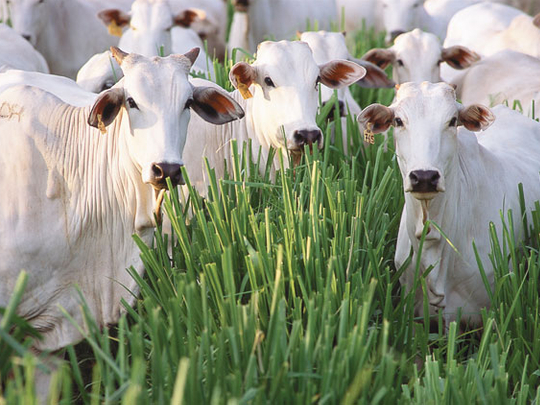
Before the day is done, three Muslim men would have slaughtered 1,600 heads of cattle according to the halal method prescribed in Islam — a ritual that is observed at a remote meat processing plant in the tiny town of Palmeira de Goiás in the southeast of Brazil's Goiás state.
Minerva, the third biggest producer and exporter of beef in Brazil, has a dedicated halal slaughter plant. Here cows are ushered into an enclosure where they are struck on the head with a hammer and collapse on the floor — dizzy but alive. The slaughterer, a Sudanese Muslim man, utters the word "Bismallah" (in the name of Allah) before he cuts their jugular veins with a sharp knife so the animals die quickly and their blood drains out in compliance with halal customs.
Muslim communities have expressed deep concerns about the authenticity of halal meat and poultry supplies from non-Muslim countries, due to problems with false halal labels or stunning of poultry as a quick way to kill the birds and increase output. This comes amid calls for a unified Halal standard, co-operation between halal certifying bodies and a global authority to supervise the industry in order to avoid malpractice, profiteering and abuse of the Halal label.
The $400 billion (Dh1.5 trillion) halal food market is a cash cow that Brazilian meat producers cannot afford to ignore. Although the certification adds to costs, the halal stamp unlocks access to huge markets in the Islamic world, Brazilian meat producers told a group of visiting journalists from the UAE.
Vigilant about compliance
Islamic countries are vigilant in sending delegates to Brazil to monitor the halal slaughter process here and ensure compliance with Islamic standards — especially as there is no government control or punishment of violations in this procedure.
Halal certification in Brazil does not involve government bodies such as the Ministry of Agriculture but relies on independent halal certification bodies approved by Islamic authorities in Arab countries, said Celio Porto, secretary for Agribusiness International Relations in the Ministry of Agriculture, in a meeting with Dubai journalists.
No complaints
"There have been no complaints [on halal authenticity] raised to the ministry in recent years," said Michel Abdo Halaby, director-general and chief executive of the Arab-Brazilian Chamber of Commerce. although a month ago the chamber detected and dealt with a fake halal product application by a company he would not name.
The Ministry of Agriculture is responsible only for the hygienic compliances and the validity of product labels, he said.
The Chamber, officially recognised by the League of Arab States, guarantees and issues a Certificate of Origin for the products to facilitate trade between exporters and importers.
Currently, 100 Brazilian beef companies are submitting their halal certification to the Arab Brazilian Chamber of Commerce for verification, according to Alaby.
Another 25 companies are considering adapting their plant for halal slaughtering or other halal procedures to export processed food such as candy, cocoa or chocolate.
In case of any violations to the halal process by the manufacturer, the Chamber takes action.
"We inform the Brazilian exporter, the certification entity in Brazil and the Brazilian authorities (Ministry of Agriculture, Cattle), that the Arab Brazilian Chamber of Commerce will not allow the export, and the exporter needs to change all the documents and present a declaration informing what went wrong with the certification, for instance," said Alaby.
Biggest plant
Minerva's halal unit in Palmeira de Goiás is the biggest out of its 10 plants in Brazil with a capacity of 350 tonnes a day. Minerva's production capacity is 1,600 head of cattle a day done in three shifts by Muslim slaughter men provided by CIBAL Halal, said Alan Serrrao, a trader at Minerva.
The entire Minerva group has a capacity of 25,000 tonnes. It produces 800 containers measuring 40 feet daily. Minerva is the third biggest exporter and producer of beef in Brazil after JBS and Marfrig, Serrao said.
Taking a tour of the plant, we saw rows of carcasses in a queue. After a cow is slaughtered, it is immediately skinned. A row of dead cows with their heads intact hangs upside down in a morbid line-up.
The bodies are expertly cut in half by professionally trained staff, unperturbed by the job at hand, in a steamy section of the plant.
The meat must mature for 24 hours before it is manually cut again and again into the parts we recognise at the butcher's shop.
Kilos of meat are then put in plastic bags and vacuum-sealed by a machine. After freezing and packaging, they are labelled and sent to loading trucks parked outside the Minerva plant.
Several stacks of boxes here were headed for Dubai, we were told.










